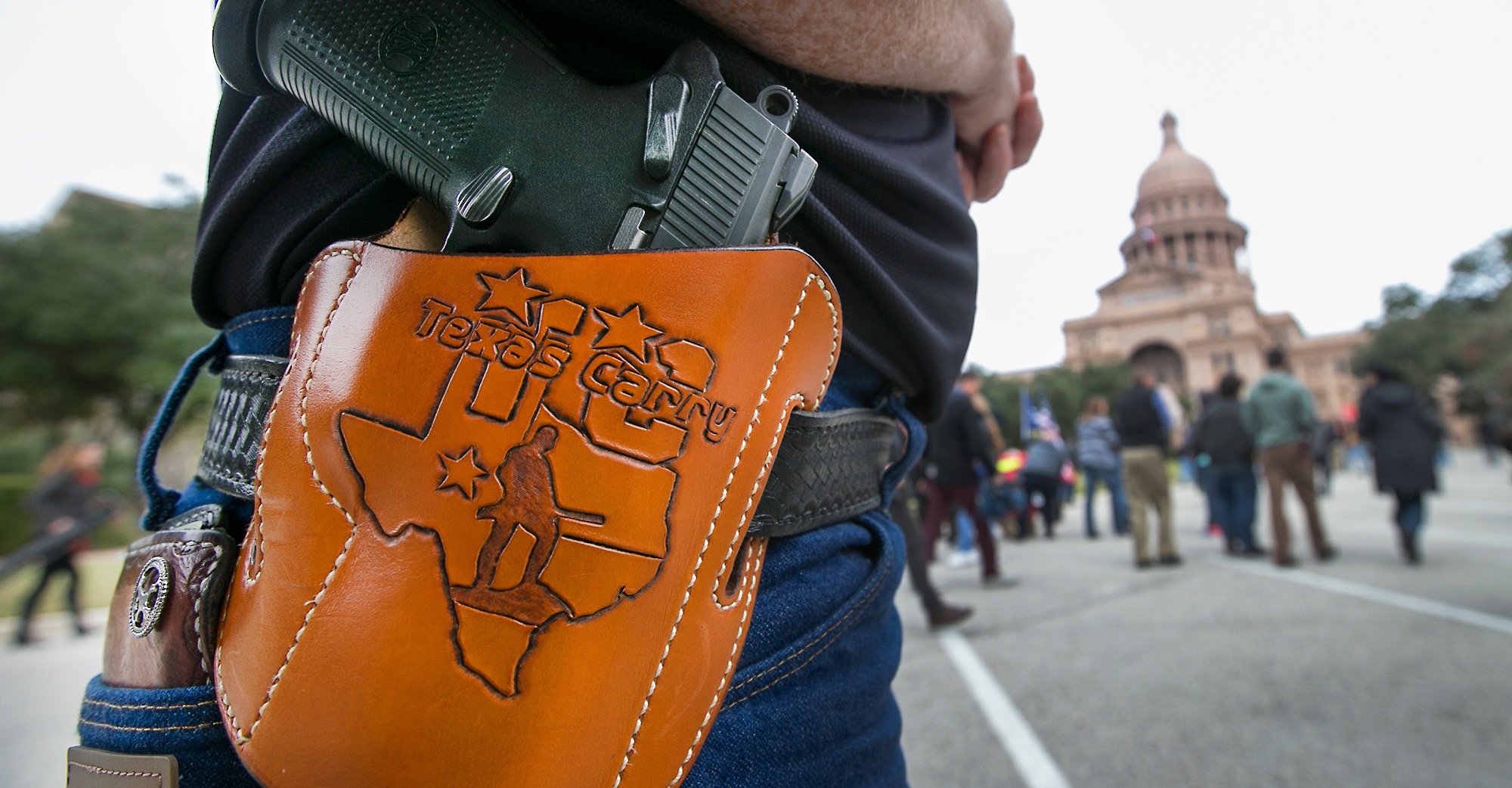On January 1, the day Texas’s new open carry law took effect, excitement gave way to anxiety for some gun owners. On TexasCHLForum.com, a message board moderated by National Rifle Association (NRA) board member Charles Cotton, reports started piling up of the measure’s unintended effects. Members noted the spread of so-called “30.07” signs, which bar openly-carried guns, in businesses around the state. But they also noticed an increased number of establishments choosing to display “30.06” signs, which forbid concealed weapons, prompting one user to lament that “we have lost more than we gained.”
At one point, Cotton himself weighed in. “I truly wish that open-carry supporters would admit that they were wrong and that there is a problem,” he wrote. “If I cannot carry my self-defense handgun into a store because they put up 30.06 and 30.07 signs, then someone’s ability to show their handgun to everyone will have cost me the ability to defend myself.”
Now, as Texas’s open carry law approaches its second month, proponents remain undeterred, and classify the worries expressed by some gun owners as a premature overreaction. The new law is still very much in the early going. But as the two sides dig in, the question is not just whether open carry will make more Texas businesses inhospitable to gun owners in the long run, but how much it has divided the state’s gun rights community.
After H.B. 910 passed in September, State Representative Matt Bernal started offering 30.07 signs to business owners in his San Antonio district. He says of the roughly 600 signs his office has already given out, about one-third of requests came from businesses that wanted both a 30.07 and a 30.06 sign. (The Texas Department of Public Safety does not track the number of businesses with 30.07 or 30.06 signs, so no official breakdown exists.) “This issue has made some people reevaluate their overall position regarding firearms in their own businesses,” he says.
Online, observations of an uptick in concealed weapons bans in the wake of open carry’s arrival have not been limited to Cotton’s forum. On January 6, reddit users discussed a flurry of activity on Texas3006.com, a website that identifies Texas businesses with signs banning firearms. “I have received more notices in the past week than in the past 3 years,” kdsmith wrote. “I am not opposed to open carry but it sure seems the new law has kicked the hornet’s nest.”
But if the law’s most ardent supporters are afraid of backlash, they aren’t showing it. Christopher “C.J.” Grisham, founder of Open Carry Texas and a Republican candidate for Texas State Senate, says some gun owners’ anxieties are unfounded, and reflect a generational divide.
“You’ve got the old school mindset that you’re not supposed to make waves when fighting for what you believe in,” Grisham says.
In some respects, Grisham sees the NRA as part of that old guard. In June 2014, when the establishment gun group published an open letter describing demonstrations lead by Open Carry Texas as “downright scary,” Grisham and other open carry supporters fired back by cutting up their NRA membership cards and mailing them back to the organization. The NRA quickly removed the letter from its website, and posted a video in support of open carry. Despite the gesture, Grisham believes the gun group — and its Texas delegates, like Charles Cotton — isn’t devoted to the cause.
“Charles is OK with incrementalizing our rights back, and I’m not,” Grisham says. “I want my rights back, period.” (Cotton declined to comment for this article.)
Grisham says the controversy over open carry law mirrors the pushback against the state’s concealed carry law in the mid-1990s. After concealed carry became legal in 1995, some business owners made it clear they wanted no part of it. But over time, Grisham argues, the shock of having patrons bring guns with them into stores and restaurants faded, and concealed carry stopped attracting as much attention. His vision is for the same thing to happen with open carry in coming years, with visible firearms eventually coming to seem routine even to non-gun owners.
That detail was echoed by Larry Arnold, legislative director of the Texas Concealed Handgun Association. Arnold pointed to dwindling backlash over open carry laws in other states, a federal law allowing guns in national parks, and even Amtrak’s policy allowing firearms on trains.
While those changes were somewhat controversial, the media storm eventually died out and gun owners went about their business without issue, Arnold says.
“The initial reaction is, ‘oh gosh, these concealed carry people are going to come in their fatigues and muddy boots and there’s going to be blood in the streets,’ and all that stuff,” Arnold says. “Once it doesn’t happen, the panic goes away.”
After the initial panic, many of the signs banning concealed carry came down in 1996. He predicts the new signs will come down too.
If nothing else, Arnold believes open carry makes good financial sense: To open carry, you have to have a pistol permit. Pistol permits cost money. So to Arnold, any open carrying customer is one for businesses to woo, because they have disposable income to spend.
“Licensees are pretty good customers,” Arnold says. “We’re not somebody you ought to be afraid of.”
But State Representative Bernal isn’t convinced that the backlash over open carry will fade away so easily. He believes the new law alienated Texans in a way that other gun laws have not, and gun rights advocates are now seeing the result.
“The difference is, I understand the arguments people made for concealed carry,” he says. “I don’t see how open carry makes things any safer. In fact, I feel like it imposes one person’s position over another.”
[Photo: Ralph Barrera/Austin American-Statesman via AP]


